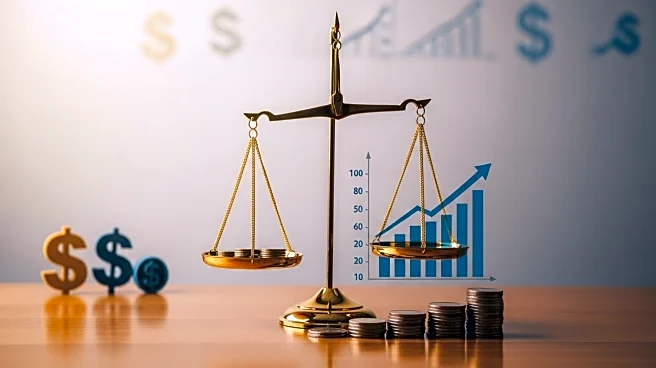What's Happening?
The U.S. economy is facing challenges as inflation rates begin to rise again, with the Consumer Price Index showing a 2.7% annual rate as of July. Consumers anticipate inflation to increase to 3.2% over the next year, according to a New York Federal Reserve survey. President Trump's tariff policies have led to increased costs for businesses, particularly in sectors like construction and manufacturing, resulting in workforce reductions. Despite these challenges, consumer spending remains strong, although credit card debt has reached record highs. The S&P 500 has seen gains, driven by expectations of Federal Reserve interest rate cuts due to poor jobs data.
Why It's Important?
The economic situation has significant implications for U.S. industries and public policy. Rising inflation and tariff impacts could lead to higher consumer prices, affecting purchasing power and economic stability. The labor market's struggles may prompt further Federal Reserve interventions, influencing interest rates and financial markets. Businesses in tariff-sensitive sectors face increased operational costs, potentially leading to more layoffs and reduced economic growth. The situation underscores the need for strategic economic policies to balance inflation control and support for affected industries.
What's Next?
The Bureau of Labor Statistics is set to release new consumer price index figures, which may provide further insights into inflation trends. The Federal Reserve's upcoming meeting could result in interest rate adjustments to support the economy. Businesses and consumers will likely continue to monitor tariff developments and inflation rates, adjusting strategies accordingly. Political leaders may face pressure to address economic concerns, potentially influencing policy decisions and electoral outcomes.
Beyond the Headlines
The economic challenges highlight broader issues such as income inequality and financial insecurity among consumers. The reliance on credit and rising debt levels may exacerbate social and economic disparities. Long-term shifts in consumer behavior and business strategies could emerge as stakeholders adapt to changing economic conditions. Ethical considerations around tariff policies and their impact on vulnerable sectors may prompt discussions on fair trade practices and economic justice.










